The Economics and Statistics Division maintains archives of previous publications for accountability purposes, but makes no updates to keep these documents current with the latest data revisions from Statistics Canada. As a result, information in older documents may not be accurate. Please exercise caution when referring to older documents. For the latest information and historical data, please contact the individual listed to the right.
<--- Return to Archive
For additional information relating to this article, please contact:
October 30, 2020TOURISM EMPLOYMENT, 2019 Statistics Canada published the Provincial and Territorial Human Resources Module for the Tourism Satellite Account (PTHRM) today. The human resources module provides information on jobs, compensation and hours worked in tourism industries and includes jobs that are attributable to demand from both tourists and non-tourists. The data released today do not account for the impact of COVID-19 pandemic but will be used as a benchmark in the future analysis.
In Nova Scotia, tourism employment increased 8.4% annually and totalled 50,968 in 2019; because tourism employment is 38.5% part time, these jobs amounted to 36,836 full-time equivalent positions. '
Nova Scotia's tourism employment growth was the second largest growth across provinces just behind Saskatchewan (+9.2%). The strong growth in Nova Scotia was mainly due to the increase seen in the food and beverage services industry which accounted for 63.4% of all jobs in the tourism sector in the province. The tourism sector accounted for 1.9 million jobs in Canada in 2019. This is an increase of 1.5% from the 2018 levels and is similar to the 2.1% growth observed in the economy overall.
Total tourism employment in Nova Scotia has been on an upward trend since 2015 and has grown by over 11,500 (or 30%) over that period. Nova Scotia had the fastest growth in terms of percentage in total tourism employment across provinces over the last five years. National tourism employment increased by 9% over the same period.
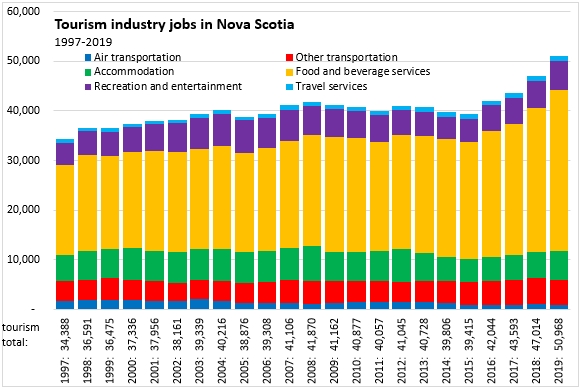
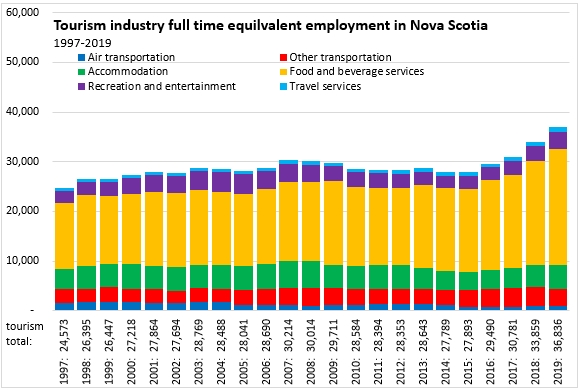

Tourism employment accounted for 10.8% of total employment in Nova Scotia. The share of tourism employment in Nova Scotia was higher compared to the national average of 9.8% and was the second highest across provinces behind British Columbia (12.05%). The share of tourism employment in Nova Scotia has been on an upward trend since 2015 and accounted for 9.3% of total employment on average over the last 10 years.
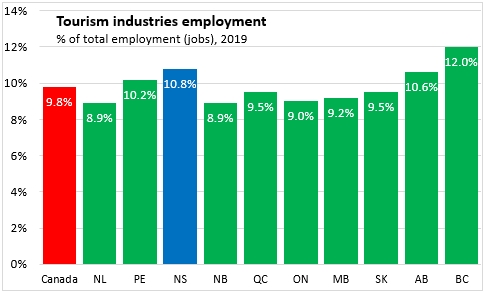
In Nova Scotia, tourism employment was mainly concentrated in the food and beverages services which accounted for 63% of total tourism employment in 2019. The accommodations industry accounted for 12% of total tourism employment while recreation and entertainment sector accounted for 11%. Transportation accounted for 12% of tourism employment in 2019.
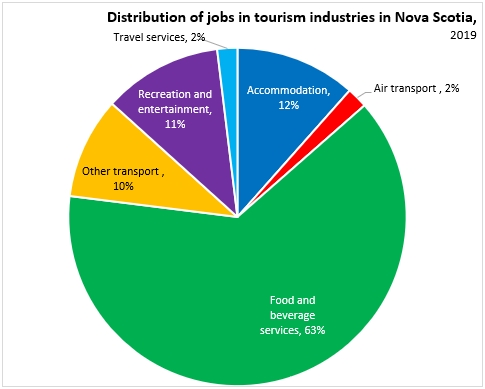
In Nova Scotia, average weekly hours worked in tourism industries was 29.3 hours in 2019, down 3.3% from 30.3 hours worked in 2018. Nationally, average weekly hours worked in tourism industries declined 1.1% annually and averaged 28.1 hours in 2019. Since 1997, the average work week in the tourism sector has decreased by 2.8 hours (-8.8%), dropping at a faster rate than the economy overall (2.1 hours or -6.0%). Statistics Canada notes that this can be attributed to the increase in part-time jobs in tourism industries. Only Prince Edward Island (+3.6%) and Manitoba (+0.8%) recorded annual gains in average weekly hours worked in 2019.
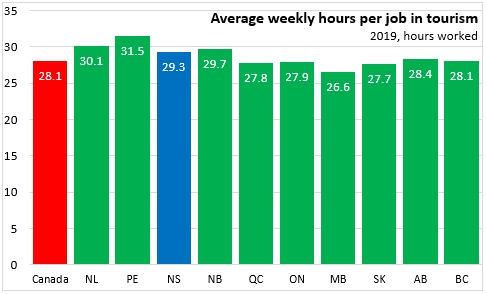
Average hourly compensation in Nova Scotia increased 5.4% from $17.9 in 2018 to $18.8 in 2019. Full-time workers in tourism industry earned on average $19.8 an hour in Nova Scotia in 2019 while part-time workers earned $15.0 an hour. Nationally, average hourly wage increased 5.1% to $22.8 in 2019. Average hourly wages were higher for full-time workers ($24.2) compared to part-time workers ($18.2).

In Nova Scotia, full-time jobs in tourism industries increased 5.2% year-over-year in 2019 while part-time jobs increased by 14%. Despite the increase in the number of jobs, the share of full-time positions in total tourism employment in Nova Scotia declined from 63.4% in 2018 to 61.5% in 2019.
Nationally, fill-time employment declined 0.6% while part-time employment increased 4.4% annually in 2019. Accordingly, the share of full-time jobs in total tourism employment declined from 58.4% in 2018 to 57.2% in 2019. The share of part-time jobs increased from 41.6% in 2018 to 42.8% in 2019. Since 2007, part-time employee and part-time self-employed jobs have increased by 37.3% and 26.4%—respectively—while full-time jobs have increased by 22.4% for employees and 1.1% for self-employed workers.
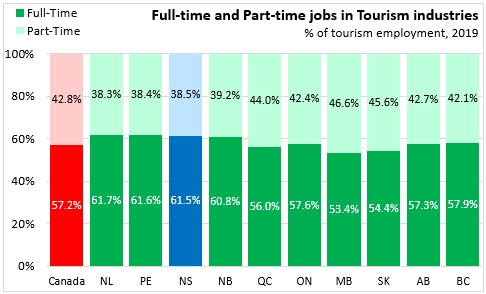
Source: Statistics Canada, Provincial and territorial human resource module of the Tourism Satellite Account, 2019
<--- Return to Archive